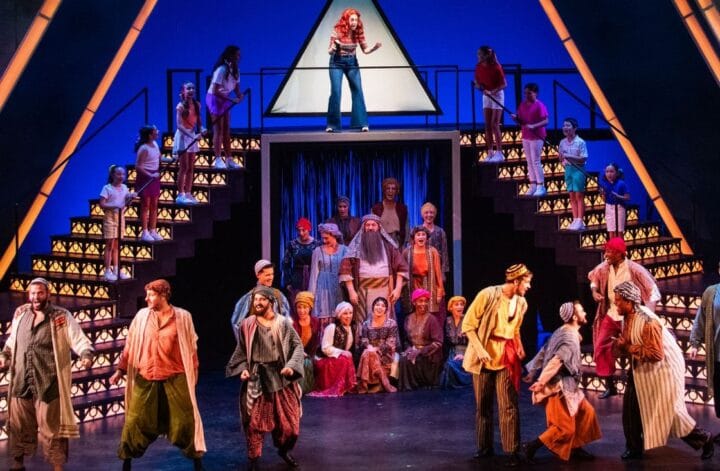Happy holidays from The Wick Theatre. And thank you for the perfect holiday gift! An age-old story of family conflict, jealousies and betrayal that are ultimately forgiven (after hard lessons learned and true remorse) remains a beacon to the power of goodness, love and hope. The Old Testament’s recital of the saga of Joseph son of Jacob, aka Israel, his experiences in Egypt, and with his brothers (destined to become the 12 tribes of Israel) is a human drama as ancient as the Bible. And as relevant as today’s news.
JOSEPH and the AMAZING TECHNICOLOR DREAMCOAT by the superstar team of Tim Rice (lyrics) and Andrew Lloyd Webber (music) – yes, they of “Jesus Christ Superstar,” “CATS,” and “The Phantom of the Opera” fame – are the mad geniuses behind this biblically accurate but artistically radical, blockbuster musical. Our play’s highly experienced and proficient director and choreographer Simon Coulthard held a lengthy acting career in London’s West End, including performing in “Joseph” in 2007! His director’s note provides a bit of history wherein, astoundingly, this musical began life as a very short school concert in 1968, with the fully realized production only opening in West End in 1973 and didn’t make it to Broadway till 1982.
I loved the mix of late 1960s/early ‘70s fashion looks for the Narrator and some dance scenes, combined with stylized Egyptian attire straight out of hieroglyphics. And then there are nods to all the different musical genres – from grand Webber melodies to bebop, calypso, country, tango … even Elvis Presley-style rock ‘n roll! Music director Bobby Peaco, as always, worked his magic. And everyone was dressed to match their numbers, thanks to costume designer Ricky Lurie and wig designer Britte Steele.
Now I’ll quote director/choreographer Simon Coulthard because he succeeded in his intent so magnificently. “Reimagining the Timeless Tale in this production, we’ve aimed to honor the original work’s joyous spirit while bringing a fresh contrast between ancient and modern: classic costumes with contemporary accents, updated choreography with traditional influences, and a grand set that allows the colors, characters, and emotions to shine.”

The curtain opens to an incandescent, graphic representation of a triangular pyramid fronted by a square central “entrance” with ascending staircase to either side, all framed by high bamboo-like rods. Jack Golden’s modern, minimalist set design serves as the perfect backdrop to all the stage action (and there’s plenty, with 25 performers, including two alternating sets of eight children). Spectacular, neon-style colored lighting – especially along the stairs that are forever changing with each number – is the work of local lighting designer extraordinaire Clifford Spulock who not only chose technicolor lighting that perfectly reflects the “technicolor dreamcoat” theme, he’s practically created a sound-and-light show of his own, backed by pro sound design by Brandon Cook and projection design (loved the streaming hieroglyphic wall) by Kacey D. Koploff.
Lesser actors might be overshadowed by such stagecraft splendor. But not ours. You won’t find better vocal talent anywhere, and I was surprised at the amount, variations, beauty and sheer athleticism (as in high leaps and in-air tumbles) exhibited by the dancers. With so many perfectly choreographed moves onstage, it was often difficult to decide where to look first!
But it’s an easy choice whenever the Narrator enters to tell Joseph’s story to the audience … and a group of attentive kids. Everything’s done through song and every time Narrator Leah Sessa is onstage, which is happily a lot, she not only brings us up to speed on what’s happening, she’s often found standing amidst the Hebrews in Canaan or the Egyptians, singing like a Greek chorus. Or she’ll break the fourth wall and flirtatiously take off with heartthrob Pharaoh after an Elvis-lookalike number. Trust me, there’s humor and method to all the madness.
But back to Leah Sessa’s multilayered performance and powerful vocals that bring the house down with every breath she takes. I recently caught her Slow Burn performance as one of three “Witches of Eastwick” and remember wishing for more. My wish was granted, as was hers, by starring in “one of her bucket list shows.” Don’t miss our local diva in her performance of a lifetime, opening with the iconic “Any Dream Will Do” (also featuring Joseph, Choir, and Ensemble).
For dreamer Joseph, the Wick tapped Miami native and recent Broadway star of “Dear Evan Hansen” (among many other national and regional productions), Stephen Christopher Anthony. His solos are striking and he manages to convince us that a good attitude and hard work, no matter the circumstance, will be recognized and rewarded by the higher-ups. (We can all dream!)
After Joseph parades around in his every-color coat (“Joseph’s Coat”) – an ostentatious gift from patriarch Jacob (Troy J. Stanley) to his favorite son – and then tells his brothers of two dreams that symbolize all men will bow down to him (“Joseph’s Dreams”), the brothers can contain their envy no longer. When the opportunity arises, they sell the young lad as a slave to a passing caravan of Ishmaelites headed for Egypt, tear up his coat, and then cover it with the blood of a slaughtered goat so they can tell their father Joseph was likely attacked by a wild animal.
Many of the songs you hear will sound familiar and fantastic – but maybe only now can you connect the dots to their origin. “One More Angel in Heaven,” in which the brothers pretend to console their grieving father, is led by eldest Reuben (Michael Scott Ross) and resonates with mournful Elvis-style rock ‘n roll. Yet when Jacob leaves the room, the tempo suddenly shifts from sad to upbeat as the unrepentant brothers kick up their heels and spin their wives in a heel-stompin’ hoedown.
The Ishmaelites sell Joseph to “Potiphar,” a captain in Pharaoh’s guard, also played and beautifully sung by deep-voiced local favorite, Troy J. Stanley (now in short black beard as opposed to Jacob’s lengthy gray one). Potiphar soon notices Joseph’s industriousness and god-given talents and appoints him head overseer of his house and fields. Potiphar’s wife takes notice of the young Hebrew as well, for his good looks, and wishes, as written in Genesis, “to lie with him.” When Joseph insists on doing right by his master and repeatedly rejects her advances – despite Sabrina Lobner’s impressive, highly seductive dance moves – she feels rejected enough to accuse him of attempted rape and her angry husband has him locked up in Pharaoh’s prison. Where he meets two fellow inmates who are troubled by their dreams and with “Go, Go, Go Joseph” (sung in catchy disco pop) correctly interprets the fate of the Butler (Noah A. Lyon) and the Baker (Richaun Stewart). Thus setting him up for a reputation as a dream interpreter and eventual release in Act II.
Here again the Narrator arrives to enlighten us, joined by Ensemble and Choir in “A Pharaoh’s Story.” Followed by “Poor Poor Pharaoh/Song of the King” (starring the Narrator, Butler, Pharaoh, Choir, Ensemble, Joseph). Followed by a stunning “Song of the King” reprise by Aaron Atkinson as King Pharaoh. After Joseph & Ensemble deliver “Pharaoh’s Dream Explained,” the king gives Joseph his signet ring and names him top overseer in charge of gathering and stocking harvest from the upcoming seven years of plenty so that Egypt can survive the seven lean years that come next.



